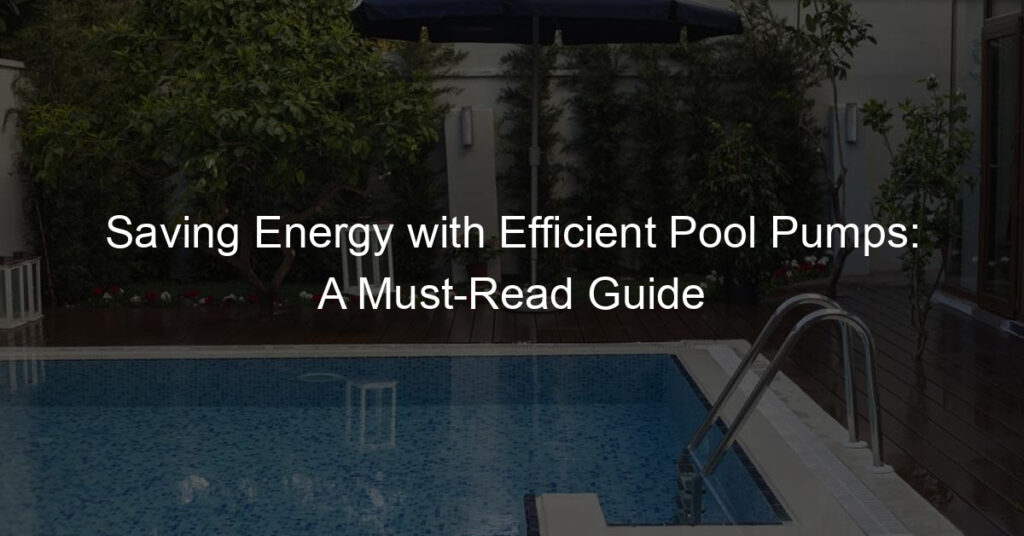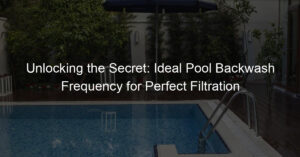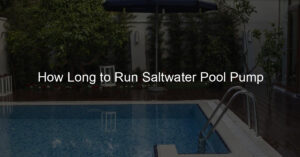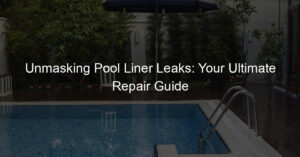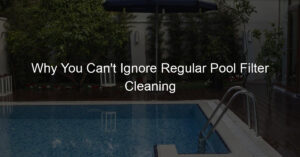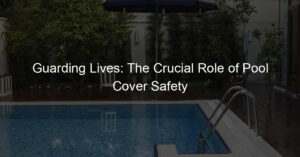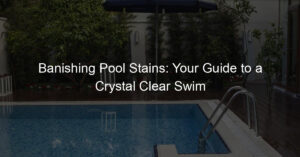Introduction to Energy-Efficient Pool Pumps
Swimming pools are a great source of fun and relaxation, but they can also consume a significant amount of energy. One of the primary culprits of this energy consumption is the pool pump. However, with the advent of energy-efficient pool pumps, it is now possible to enjoy your pool while also conserving energy. This article will provide an introduction to energy-efficient pool pumps and their importance.
- Understanding the Importance of Energy Conservation in Pool Pumps
- Overview of Energy-Efficient Pool Pumps
Pool pumps play a crucial role in maintaining the cleanliness and safety of your pool by circulating water and distributing chemicals evenly. However, traditional pool pumps can consume as much energy as all other home appliances combined. This not only leads to high energy bills but also contributes to environmental degradation.
By switching to an energy-efficient pool pump, you can reduce your pool’s energy consumption by up to 80%. This translates into significant cost savings and a smaller carbon footprint. Furthermore, energy-efficient pool pumps are often quieter and require less maintenance than their traditional counterparts, providing additional benefits.
Energy-efficient pool pumps, also known as variable-speed pumps, operate at different speeds depending on the pool’s needs. This is in contrast to single-speed pumps, which always operate at maximum speed, regardless of whether such power is needed.
By adjusting their speed, energy-efficient pool pumps can perform tasks like filtering water at a lower speed, which requires less energy. They can then ramp up their speed for more demanding tasks, such as operating a water feature. This ability to adjust speed not only saves energy but also extends the pump’s lifespan.
While energy-efficient pool pumps have a higher upfront cost than single-speed pumps, they typically pay for themselves within two to three years through energy savings. Additionally, many utility companies offer rebates for installing energy-efficient pool pumps, further offsetting the cost.
In conclusion, energy-efficient pool pumps are a smart investment for any pool owner. They not only save money and energy but also contribute to a healthier environment. As we continue to explore the topics of pool pump energy saving, we will delve deeper into the types of eco-friendly pool pumps, how to choose an efficient pool pump system, and how to maintain its energy efficiency.
The Need for Pool Pump Energy Saving
As we continue to strive for a greener planet, it’s crucial to consider every aspect of our daily lives, including the operation of our swimming pools. Traditional pool pumps, while effective, can have a significant environmental impact and can also be a drain on your wallet. Let’s explore these two key reasons why we should consider energy-saving pool equipment.
- Environmental Impact of Traditional Pool Pumps
- Financial Benefits of Energy-Saving Pool Equipment
Traditional pool pumps can consume a lot of energy. In fact, they are often the second-largest energy consumer in a home, after the HVAC system. This high energy consumption contributes to greenhouse gas emissions, which are a leading cause of climate change. Furthermore, these pumps can also lead to noise pollution, disrupting the peace and quiet of your backyard oasis.
Switching to energy-efficient pool equipment can result in significant savings on your energy bills. According to the U.S. Department of Energy, an energy-efficient pool pump can save up to 80% in energy costs compared to a traditional pump. Over time, these savings can add up, making the initial investment in energy-efficient equipment well worth it. Plus, using less energy means your pool pump will likely last longer, saving you money on replacement costs as well.
As you can see, there are compelling reasons to consider energy-saving pool equipment. Not only can you help protect our planet, but you can also keep more money in your pocket. In the next section, we’ll explore different types of eco-friendly pool pumps that can help you achieve these benefits.
Types of Eco-Friendly Pool Pumps
When it comes to pool pumps, there are several types that are eco-friendly and energy-efficient. One of these types is the high-efficiency pool pump.
High-Efficiency Pool Pumps
High-efficiency pool pumps are designed to use less energy while still providing the necessary power to keep your pool clean and well-maintained. They are an excellent choice for those looking to reduce their environmental impact and save on energy costs.
- Features and benefits of high-efficiency pool pumps
- Case study: Energy saving with high-efficiency pool pumps
High-efficiency pool pumps come with a variety of features that contribute to their energy-saving capabilities. These include advanced motor designs, optimized water flow rates, and programmable settings that allow for optimal operation times. The benefits of these pumps are numerous. They can significantly reduce your pool’s energy consumption, leading to lower utility bills. Additionally, they tend to have a longer lifespan than traditional pool pumps, meaning less frequent replacement and less waste.
To illustrate the energy-saving potential of high-efficiency pool pumps, let’s look at a case study. A homeowner in Florida replaced their old, standard pool pump with a high-efficiency model. Over the course of a year, they saw a 75% reduction in their pool’s energy consumption. This translated to a savings of over $500 on their energy bill for that year. This case study clearly shows the potential for significant energy savings with high-efficiency pool pumps.
High-efficiency pool pumps are an excellent choice for any pool owner looking to reduce their environmental impact and save on energy costs. They offer a range of features designed to optimize energy use and provide significant savings over time.
Variable Speed Pool Pumps
Among the different types of eco-friendly pool pumps, variable speed pool pumps stand out due to their unique features and significant contributions to energy saving. Let’s dive deeper to understand these pumps and how they can help reduce energy consumption.
- Understanding Variable Speed Pool Pumps
- How Variable Speed Pumps Contribute to Pool Pump Energy Reduction
Variable speed pool pumps are advanced devices designed to regulate the speed at which they operate. Unlike single-speed pumps that run at a constant speed, these pumps can adjust their speed based on the pool’s needs. This means they can run slower when the pool is not in use and faster when it’s busy, such as during a pool party. This flexibility allows them to use just the right amount of energy, avoiding unnecessary power consumption.
Variable speed pumps play a crucial role in reducing pool pump energy. By adjusting their speed, they can operate more efficiently and use less energy. For instance, when the pool is not in use, the pump can run at a slower speed, using less energy. This can lead to significant energy savings over time.
According to a study, variable speed pumps can save up to 90% of energy compared to traditional single-speed pumps. This not only helps in reducing energy bills but also contributes to a greener environment by reducing carbon emissions.
In conclusion, variable speed pool pumps are an excellent choice for those looking to make their pools more energy-efficient. They offer flexibility, efficiency, and significant energy savings, making them a smart investment for any pool owner.
Energy Saving in Swimming Pools: Beyond the Pump
While pool pumps play a significant role in energy conservation, there are other methods to save energy in swimming pools. Let’s explore two of these methods: energy-efficient heating systems and smart pool covers.
- Energy-efficient heating systems for pools
Heating a swimming pool can consume a lot of energy, especially during colder months. However, energy-efficient heating systems can help reduce this consumption significantly. These systems use innovative technology to heat the pool water more efficiently, thus saving energy.
For instance, solar heaters can harness the power of the sun to warm your pool. They absorb sunlight and convert it into heat, which is then transferred to the pool water. This method is not only energy-efficient but also environmentally friendly as it reduces the reliance on fossil fuels.
Another example is the heat pump pool heater. It operates by extracting heat from the air or ground and transferring it to the pool water. This process uses less energy compared to traditional gas or electric heaters, making it a more energy-efficient option.
- Smart pool covers for energy conservation
Smart pool covers are another excellent way to save energy in swimming pools. These covers are designed to retain heat, reduce evaporation, and keep debris out of the pool. This means less energy is needed to heat the pool and keep it clean.
Some smart pool covers are automated and can be controlled using a remote or a smartphone app. This feature allows you to cover or uncover the pool with ease, ensuring it is covered when not in use to conserve energy.
Moreover, certain smart pool covers are equipped with solar cells that absorb sunlight and convert it into electricity. This electricity can then be used to power pool equipment, further contributing to energy savings.
In conclusion, while pool pumps are crucial for energy conservation in swimming pools, they are not the only solution. Energy-efficient heating systems and smart pool covers can also contribute significantly to energy savings. By implementing these methods, you can enjoy your swimming pool while also reducing your energy consumption and environmental impact.
Choosing Efficient Pool Pump Systems
When it comes to saving energy and reducing your pool’s operating costs, choosing the right pool pump system is crucial. This section will guide you through the process of assessing your pool’s needs, comparing different types of energy-efficient pool pumps, and making the switch to an upgraded system.
- Assessing Your Pool’s Needs
Before you can choose an efficient pool pump system, you must first understand your pool’s specific needs. This involves considering factors such as the size of your pool, the number of swimmers it regularly accommodates, and the amount of debris it typically collects. For instance, larger pools or those with heavy swimmer traffic may require more powerful pumps, while pools in areas with many trees may need pumps with stronger filtration capabilities.
- Comparing Different Types of Energy-Efficient Pool Pumps
Once you’ve assessed your pool’s needs, the next step is to compare the different types of energy-efficient pool pumps available. Two main types are single-speed pumps and variable-speed pumps. Single-speed pumps operate at a constant speed, while variable-speed pumps can adjust their speed based on the pool’s needs, making them more energy-efficient. According to a case study, variable-speed pumps can save up to 90% in energy costs compared to single-speed pumps.
- Making the Switch: Steps to Upgrade Your Pool Pump
After you’ve chosen the right energy-efficient pool pump for your needs, it’s time to make the switch. Here are the basic steps to upgrade your pool pump:
- Turn off and disconnect the old pump.
- Connect the new pump to the pool’s plumbing system.
- Set up the pump’s control system according to the manufacturer’s instructions.
- Turn on the new pump and check for leaks or other issues.
Remember, if you’re not comfortable doing this yourself, it’s always best to hire a professional.
In conclusion, choosing an efficient pool pump system involves assessing your pool’s needs, comparing different types of pumps, and carefully making the switch. By taking these steps, you can significantly reduce your pool’s energy consumption and operating costs, making your pool more eco-friendly and cost-effective.
Maintaining Pool Pump Energy Efficiency
Keeping your pool pump running at its best doesn’t just mean cleaner water. It also means saving energy and money. Here are some key ways to maintain your pool pump’s energy efficiency.
- Regular Maintenance for Energy Conservation Pool Pumps
- Tips for Maximizing Your Pool Pump’s Efficiency
Regular maintenance is crucial to keep your pool pump working efficiently. It’s like taking care of a car – if you ignore it, it won’t run as well or last as long.
First, clean your pool pump’s filter regularly. A dirty filter makes the pump work harder, using more energy. Aim to clean it every two weeks or so, depending on how often you use your pool.
Second, check your pump’s motor regularly. Listen for strange noises and look for leaks. If you find any issues, get them fixed as soon as possible. A well-maintained motor uses less energy.
Finally, keep an eye on your pool’s water level. If it’s too low, your pump will have to work harder to circulate the water. This uses more energy and can wear out your pump faster.
There are also some simple tips you can follow to get the most out of your pool pump.
One, run your pump during off-peak hours. This is usually at night when electricity rates are lower. This won’t make your pump more efficient, but it will save you money.
Two, don’t run your pump longer than necessary. Most pools only need to be circulated for 8 hours a day. Running your pump longer than this won’t make your pool cleaner, but it will use more energy.
Three, consider investing in a variable speed pump. These pumps can adjust their speed to the task at hand, using only as much energy as necessary. This can save a lot of energy compared to single speed pumps.
Remember, maintaining your pool pump’s energy efficiency isn’t just good for the environment. It’s also good for your wallet. So take the time to care for your pump, and it will reward you with cleaner water and lower energy bills.
Conclusion: The Future of Pool Pump Energy Saving
As we look ahead, the future of pool pump energy saving is bright and promising. The industry is constantly evolving, with new technologies and trends emerging that promise to make our swimming pools even more energy-efficient. Let’s delve into these emerging trends and discuss the importance of energy-saving in swimming pools.
- Emerging trends in energy-efficient pool equipment
- Final thoughts on the importance of energy-saving in swimming pools
One of the most exciting trends in pool equipment is the development of variable speed pumps. These pumps adjust their speed based on the pool’s needs, which can significantly reduce energy consumption. Moreover, we are seeing an increase in the use of solar-powered pool pumps. These pumps harness the power of the sun, making them a renewable and cost-effective option for pool owners.
Another trend is the use of smart pool equipment. These devices can be controlled remotely and can even learn your pool’s usage patterns to optimize energy use. For instance, they can run the pool pump during off-peak hours when electricity rates are lower. This not only saves energy but also reduces the cost of running your pool.
Energy-saving in swimming pools is more than just a trend; it’s a necessity. With the increasing awareness about the impact of our actions on the environment, it’s crucial that we do our part to reduce energy consumption. And the pool is a great place to start.
By investing in energy-efficient pool equipment, we can significantly reduce our pools’ energy consumption. This not only helps the environment but also saves us money in the long run. Moreover, it enhances the performance and lifespan of our pool equipment, making it a win-win situation.
In conclusion, the future of pool pump energy saving is bright. With emerging trends like variable speed pumps, solar-powered pumps, and smart pool equipment, we can look forward to a future where our swimming pools are not only enjoyable but also energy-efficient and eco-friendly. So, let’s embrace these trends and make our pools a part of the solution, not the problem.

